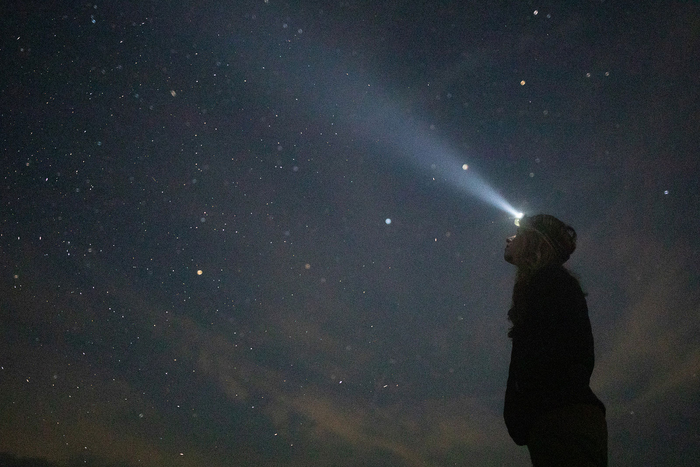Scientists have called for a legally-binding treaty to ensure Earth’s orbit isn’t irreparably harmed by the future expansion of the global space industry.

Credit: Eleanor Burfitt/University of Plymouth
Scientists have called for a legally-binding treaty to ensure Earth’s orbit isn’t irreparably harmed by the future expansion of the global space industry.
In the week that nearly 200 countries agreed to a treaty to protect the High Seas after a 20-year process, the experts believe society needs to take the lessons learned from one part of our planet to another.
The number of satellites in orbit is expected to increase from 9,000 today to over 60,000 by 2030, with estimates suggesting there are already more than 100 trillion untracked pieces of old satellites circling the planet.
While such technology is used to provide a huge range of social and environmental benefits, there are fears the predicted growth of the industry could make large parts of Earth’s orbit unusable.
Writing in the journal Science, an international collaboration of experts in fields including satellite technology and ocean plastic pollution say this demonstrates the urgent need for global consensus on how best to govern Earth’s orbit.
They acknowledge that a number of industries and countries are starting to focus on satellite sustainability, but say this should be enforced to include any nation with plans to use Earth’s orbit.
Any agreement, they add, should include measures to implement producer and user responsibility for satellites and debris, from the time they launch onwards. Commercial costs should also be considered when looking at ways to incentivise accountability. Such considerations are consistent with current proposals to address ocean plastic pollution as countries begin negotiations for the Global Plastics Treaty.
The experts also believe that unless action is taken immediately, large parts of our planet’s immediate surroundings risk the same fate as the High Seas where insubstantial governance has led to overfishing, habitat destruction, deep-sea mining exploration, and plastic pollution.
The article was co-authored by researchers from the University of Plymouth, Arribada Initiative, The University of Texas at Austin, California Institute of Technology, NASA Jet Propulsion Laboratory, Spaceport Cornwall, and ZSL (Zoological Society of London).
They include the academic who led the first ever study into marine microplastics, also published in Science almost 20 years ago, and scientists who contributed to the commitment to develop a Global Plastics Treaty signed by 170 world leaders at the United Nations Environment Assembly in March 2022.
Dr Imogen Napper, Research Fellow at the University of Plymouth, led the newly-published study with funding from the National Geographical Society. She said: “The issue of plastic pollution, and many of the other challenges facing our ocean, is now attracting global attention. However, there has been limited collaborative action and implementation has been slow. Now we are in a similar situation with the accumulation of space debris. Taking into consideration what we have learnt from the high seas, we can avoid making the same mistakes and work collectively to prevent a tragedy of the commons in space. Without a global agreement we could find ourselves on a similar path”.
Heather Koldewey, ZSL’s Senior Marine Technical Advisor, said: “To tackle planetary problems, we need to bring together scientists from across disciplines to identify and accelerate solutions. As a marine biologist I never imagined writing a paper on space, but through this collaborative research identified so many parallels with the challenges of tackling environmental issues in the ocean. We just need to get better at the uptake of science into management and policy.”
Dr Moriba Jah, Associate Professor of Aerospace Engineering and Engineering Mechanics at The University of Texas at Austin, said: “Ancient TEK (traditional ecological knowledge) informs us how we must embrace stewardship because our lives depend on it. I’m excited to work with others in highlighting the links and interconnectedness amongst all things and that marine debris and space debris are both an anthropogenic detriment that is avoidable.”
Dr Kimberley Miner, Scientist at the NASA Jet Propulsion Laboratory, said: “Mirroring the new UN ocean initiative, minimizing the pollution of the lower Earth orbit will allow continued space exploration, satellite continuity, and the growth of life-changing space technology.”
Melissa Quinn, Head of Spaceport Cornwall, said: “Satellites are vital to the health of our people, economies, security and Earth itself. However, using space to benefit people and planet is at risk. By comparing how we have treated our seas, we can be proactive before we damage the use of space for future generations. Humanity needs to take responsibility for our behaviours in space now, not later. I encourage all leaders to take note, to recognise the significance of this next step and to become jointly accountable.”
Professor Richard Thompson OBE, Head of the International Marine Litter Research Unit at the University of Plymouth, said: “I have spent most of my career working on the accumulation of plastic litter in the marine environment; the harm it can bring and the potential solutions. It is very clear that much of the pollution we see today could have been avoided. We were well aware of the issue of plastic pollution a decade ago, and had we acted then the quantity of plastic in our oceans might be half of what it is today. Going forward we need to take a much more proactive stance to help safeguard the future of our planet. There is much that can be learned from mistakes made in our oceans that is relevance to the accumulation of debris in space.”
Journal
Science
DOI
10.1126/science.adg8989
Method of Research
Literature review
Subject of Research
Not applicable
Article Title
Protect Earth’s orbit: Avoid high seas mistakes
Article Publication Date
10-Mar-2023




